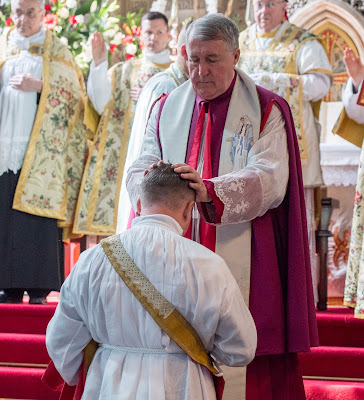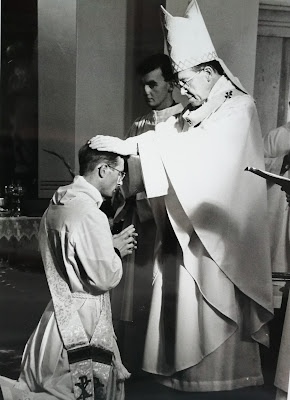Solemnity of Ss Peter and Paul on Thursday.
Low Mass - Ordinary Form at 9.30am
Missa Cantata - Traditional Form at 7.30pm
(Please note the slightly later than usual time for this Holyday Mass)
Followed by light refreshments to raise a glass to these great Saints;
Saints of true catholicity, according to Pope Emeritus Benedict.
HOMILY OF HIS HOLINESS BENEDICT XVI
St Peter's Basilica
Wednesday, 29 June 2005
Dear Brothers and Sisters,
The Feast of the Holy Apostles Peter and Paul is at the same time a grateful memorial of the great witnesses of Jesus Christ and a solemn confession for the Church: one, holy, catholic and apostolic. It is first and foremost a feast of catholicity. The sign of Pentecost - the new community that speaks all languages and unites all peoples into one people, in one family of God -, this sign has become a reality.
The purpose of the mission is that humanity itself becomes a living glorification of God, the true worship that God expects: this is the deepest meaning of catholicity - a catholicity that has already been given to us, towards which we must constantly start out again. Catholicity does not only express a horizontal dimension, the gathering of many people in unity, but also a vertical dimension: it is only by raising our eyes to God, by opening ourselves to him, that we can truly become one.
Catholicity means universality - a multiplicity that becomes unity; a unity that nevertheless remains multiplicity. From Paul's words on the Church's universality we have already seen that the ability of nations to get the better of themselves in order to look towards the one God, is part of this unity. In the second century, the founder of Catholic theology, St Irenaeus of Lyons, described very beautifully this bond between catholicity and unity and I quote him. He says:
"The Church spread across the world diligently safeguards this doctrine and this faith, forming as it were one family: the same faith, with one mind and one heart, the same preaching, teaching and tradition as if she had but one mouth. Languages abound according to the region but the power of our tradition is one and the same. The Churches in Germany do not differ in faith or tradition, neither do those in Spain, Gaul, Egypt, Libya, the Orient, the centre of the earth; just as the sun, God's creature, is one alone and identical throughout the world, so the light of true preaching shines everywhere and illuminates all who desire to attain knowledge of the truth" (Adv. Haer. I 10, 2).
The unity of men and women in their multiplicity has become possible because God, this one God of heaven and earth, has shown himself to us; because the essential truth about our lives, our "where from?" and "where to?" became visible when he revealed himself to us and enabled us to see his face, himself, in Jesus Christ. This truth about the essence of our being, living and dying, a truth that God made visible, unites us and makes us brothers and sisters. Catholicity and unity go hand in hand. And unity has a content: the faith that the Apostles passed on to us in Christ's name.
We have said that the catholicity of the Church and the unity of the Church go together. The fact that both dimensions become visible to us in the figures of the holy Apostles already shows us the consequent characteristic of the Church: she is apostolic. What does this mean?
The Church is apostolic, because she professes the faith of the Apostles and attempts to live it. There is a unity that marks the Twelve called by the Lord, but there is also continuity in the apostolic mission. St Peter, in his First Letter, described himself as "a fellow elder" of the presbyters to whom he writes (5: 1). And with this he expressed the principle of apostolic succession: the same ministry which he had received from the Lord now continues in the Church through priestly ordination. The Word of God is not only written but, thanks to the testimonies that the Lord in the sacrament has inscribed in the apostolic ministry, it remains a living word.
Let us pray to the Lord that the truth of these words may be deeply impressed in our hearts, together with his joy and with his responsibility; let us pray that shining out from the Eucharistic Celebration it will become increasingly the force that shapes our lives.

























































